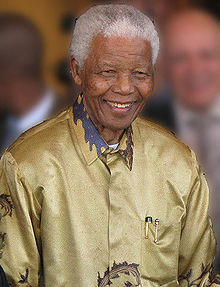 "A Nation should not be judged by how it treats its highest citizens, but it's lowest ones"
"A Nation should not be judged by how it treats its highest citizens, but it's lowest ones"
― Nelson Mandela, Long Walk to Freedom
This week, as we honor the life of Nelson Mandela, we hold the entire community in Newtown, Connecticut, in our hearts. December 14th is the one-year anniversary of the unthinkable tragedy that shook us all to our core. Since that chilling day, we have mourned. We also have witnessed extraordinary breakthroughs, with unprecedented support from the White House, an open national dialogue about mental health and careful consideration of the health care and education of our children. Progress has been made this year, particularly with the long-overdue implementation of mental health parity under the Affordable Care Act. There is hope!
At the Flawless Foundation, we work with children who share many of the challenges that Adam Lanza struggled with for his entire life. The good news is that almost every day we see hope, healing and the spark of light in our children. But we still have a long way to go in changing the prejudice that surrounds the misunderstanding of mental illness.
Adam Lanza and his mother Nancy are no longer alive, but the insidious discrimination that plagued them still persists. The state of Connecticut's recent report has unleashed another round of judgment against two people who were victims of a system and a society that failed them. Instead of being recognized as a person with a medical condition who committed terrible acts, Adam is being villanized by many, while his mother is being blamed as an incompetent parent. Though Mrs. Lanza may have had mental health challenges herself and made poor choices, she remained fiercely committed to Adam's well being and education despite the overwhelming burden of his care and barriers to access appropriate services.
In the aftermath of these tragedies, I often pose challenging questions for us to consider. We all agree that what Adam Lanza did was unspeakable and we will never know the definitive reason for his motives -- yet perhaps the more complex question is where did we learn that judgment is acceptable? Adam Lanza's aunt, Marsha Lanza has described the painful stigma that has affected the entire extended family. Her children have been taunted and she has been shamed in public because of their last name. Where did we get permission to attack, make assumptions and publicly slander rather than recognize the reality of a family living with an illness that affects everyone around them?
After the Aurora shootings, I asked if hatred is a choice, if we truly have any other option but to offer compassion to those who suffer from these physical disorders of the brain that are compounded by community and societal factors? While the anguish was paralyzing for us all during those cold days of December 2012, perhaps it helped us to try and forget, to exclude Adam and Nancy Lanza from the death toll? A few months after the dust had settled, I pointed out this example of disenfranchisement and asked if we truly believed that the heartbeat and breath of one person was more important than another?
Now I pose the question, how does it serve us to judge the Lanza family? Why do we feed this dynamic even in their passing? One thing we know for sure is that isolation and shame are harmful for people living with mental health challenges. It certainly seems that isolation exacerbated the situation of Adam Lanza and his mother. In reality, how does being alone and rejected by one's friends and family affect any person's well-being, mental health challenges or not? This is something within our power to take action and change. We must build caring communities that are more inclusive and promote healing for all.
As we send our global prayers and thoughts to Nelson Mandela and the community in Newtown, can we expand our hearts to include Adam, a young man who died from a life-threatening medical condition, and his mother, Nancy, who was his sole caregiver? Can we borrow a tiny drop of the dignity and respect from the beautiful pageantry of Nelson Mandela's funeral to acknowledge the heartbreaking passing of this mother and son? I can't help but think that choosing love over hate is probably good for the collective karma and soul of our country. I wonder what Nelson Mandela would say?
"It always seems impossible until it's done." - Nelson Mandela